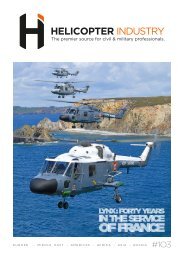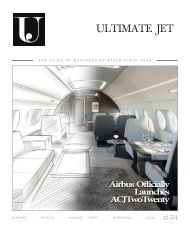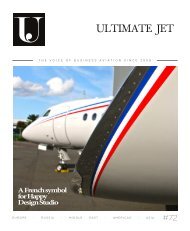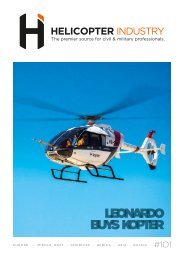Ultimate Jet #73 - Phenom 300E Flight Test
After more than 14 years, Ultimate Jet is the leading magazine dedicated to Business Aviation. In this latest issue, an analysis of how business aviation manufacturers faced Covid-19; an interview of Jahid Fazal-Karim CEO of JetCraft; a cabin design review by M&R Design Concepts; and discover the long awaited exclusive Embraer Phenom 300E Flight Test.
After more than 14 years, Ultimate Jet is the leading magazine dedicated to Business Aviation. In this latest issue, an analysis of how business aviation manufacturers faced Covid-19; an interview of Jahid Fazal-Karim CEO of JetCraft; a cabin design review by M&R Design Concepts; and discover the long awaited exclusive Embraer Phenom 300E Flight Test.
Create successful ePaper yourself
Turn your PDF publications into a flip-book with our unique Google optimized e-Paper software.
Partnership with Compensaid<br />
AirGO has chosen to work with Compensaid, the new sustainability<br />
platform built by the Lufthansa Innovation Hub. Lufthansa Group’s<br />
main carbon offset solution Compensaid is one of the leading<br />
providers with a transparent and comprehensive product.<br />
«Introducing our offset program powered by Compensaid, we are the<br />
first business aviation company to offer their customers emission<br />
compensation by purchasing Sustainable Aviation Fuel (SAF),» explains<br />
Daniela Flierl. «Compensaid uses SAF that recycles different kinds of<br />
waste. While the purchase of SAF results in a higher price compared to<br />
conventional offsetting methods, it bears the advantage of compensation<br />
with an immediate effect.»<br />
The program gives customers full flexibility about how they want to<br />
compensate for the CO2 emission of their flights.<br />
Apart from the option to invest in SAF, Compensaid offers to make<br />
up for the CO2 emissions through reforestation. In partnership<br />
with Swiss climate organization myClimate, the contribution will<br />
be invested in a project in Nicaragua directly helping to reforest<br />
the region. Reforestation is a good choice as it also helps conserve<br />
wetlands and preserve biodiversity. Reforestation, however, is not<br />
as immediate as SAF, but rather allows for long-term compensation<br />
over a period of 20 years.<br />
«We want to give our customers full control to support a compensation<br />
method they personally believe in, to choose at what price and how fast<br />
to offset their carbon emissions,» says Daniela Flierl.<br />
«This is why we offer to purchase SAF, support reforestation projects,<br />
or a combination of both. Compensaid forwards 100% of the traveller’s<br />
contribution to the respective cause and covers all payment and logistic<br />
fees separately.»<br />
In May 2019 AirGO participated in the ‘Fueling for Future’ event in<br />
Farnborough Airport introducing SAF to the stakeholders of European<br />
business aviation. In the course of this event, AirGO was among<br />
the first European operators to fuel their aircraft with Sustainable<br />
Alternative <strong>Jet</strong> Fuel (SAJF).<br />
Unlike conventional petroleum-based fuel drawn from the earth, SAF<br />
is extracted from resources, which during their previous useful life<br />
captured CO2. Through thermochemical, biochemical and catalytic<br />
production processes feedstocks such as cooking oil, trash, waste<br />
gases, agricultural residues are transformed into fuel. The result is a<br />
reduction in net life-cycle Carbon-dioxide emissions.<br />
Furthermore, compared to other biofuels, the SAF purchased<br />
through Compensaid is produced solely from different pre-existing<br />
waste materials rather than purpose-grown biomass. Thereby, the<br />
expansion of existing and creation of new monoculture for the fuel<br />
production is avoided.<br />
SAF is available today, but the accessibility is very limited. Its price is<br />
also significantly higher than the price of fossil fuel.<br />
«This is mainly due to the lack of commercial-scale investment and<br />
infrastructures,» explains Daniela Flierl. «Due to currently low economies<br />
of scale, production costs are high. Once SAF becomes commercialized,<br />
it would be able to compete with conventional fuel. It is Compensaid’s<br />
overarching goal to increase SAF supply and demand to a point where<br />
it is available to the entire aviation industry at a more affordable rate.»<br />
In partnership with Lufthansa’s fuel management and sustainability<br />
department, Compensaid offers a carbon reduction through SAF at<br />
the price difference of SAF to conventional jet fuel.<br />
<strong>Ultimate</strong> <strong>Jet</strong> I 55









